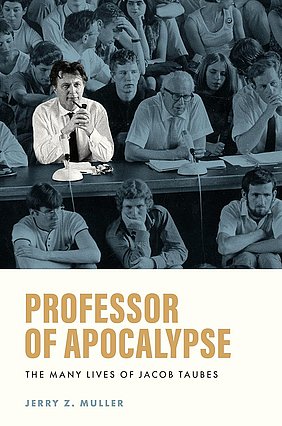The best biographies toe a delicate line between being a well-researched and faithful recounting of the life and times of their subject and providing a compelling narrative that avoids hagiography. Jerry Muller's most recent biography on the 20th-century thinker Jacob Taubes does just this. Professor of Apocalypse: The Many Lives of Jacob Taubes is a book of intricacies and minute details attested by extensive notes and interviews conducted for this project. It is a comprehensive and expertly researched biography of a character who left little in terms of a written corpus, yet found himself in the background of significant debates, controversies, and intellectual affairs of the last century.
The book seeks to understand Taubes as an intellectual floating in an ecumenical and academic ether of Protestant, Catholic, secular, and, most importantly, Jewish worlds. It traces Taubes across his peripatetic academic career between New York, Jerusalem, Princeton, Boston, Berlin, and Paris (3-4). While the book functions as a recounting of the colorful life and misadventures of Taubes, it also reads as an intellectual history of Europe, Israel, and the United States during his life. Taubes seems to be at every important intellectual juncture, developing friendships and occasionally fighting with figures who have shaped philosophy, theology, literature, politics, and critical theory, such as Susan Sontag, Jürgen Habermas, Gershom Scholem, Martin Buber, Karl Barth, Paul Tillich, Theodor Adorno, and Herbert Marcuse, to name a mere few. The life of Taubes encapsulates academic disputes, political conflicts, personal crises, and cultural milieus across three continents.
The book is organized chronologically across seventeen chapters that detail Taubes’ life, covering where he was living and significant events. This chronological architecture makes the book easy to follow for both expert and novice readers. Muller goes deep into the intricate details of his life, his thoughts, friends, and associates who made up Taubes’ world. The text does an exceptional job at weaving the events of Taubes’ life and the wider historical context. Muller looks into Taubes’ Jewish yichus, or lineage (9), while highlighting his transgressive flair as a seeming apikores, or heretic theologian (171). At the granular level it traces Taubes' deep interest in eschatology, (75) philosophy of history, and theology. In addition, to highlighting his advocacy and active political commitment while at the Free University of Berlin. Muller wants to clearly show that his academic interests informed his political commitments as a proponent of radical social change. This text effectively paints Taubes as both a Machiavellian academic and as someone deeply connected to larger transnational intellectual debates. As an “impresario of ideas,” (316) Taubes was an early promoter of authors such as Jacques Derrida, Michel Foucault, and many others.
While this book focuses heavily on intellectual history, it does not shy away from the personal side, detailing Taubes’ many affairs with married women, students and his struggle with mental health, which affected his relationships and career (392). The text clearly and unabashedly shows the manifold ways Taubes was a rulebreaker in his personal life and in his professional life as he pushed the boundaries of academic disciplines. Taubes’ boundary pushing is best exemplified by his deep interest in, promotion of, and relationship with Carl Schmitt, best known as one of the juridical architects of Nazi Germany, many times to the chagrin of his closest friends. Despite being Jewish, Taubes was enraptured by this theorist of Nazi jurisprudence, whom he considered one of the most influential thinkers of the 20th century, even though he thought of himself as a foil to Schmitt's own theorization (502).
The book seeks to highlight the liminal space inhabited by Taubes' thought drawing from both his Jewish background and his lifelong interest in Christianity, best exhibited by his fascination with St. Paul. Taubes had an obsessive interest in Saul of Tarsus (later the Apostle Paul), which he saw as symbolic to his own intellectual tensions. As a well-studied rabbi, Taubes was able to identify the Jewishness of Paul, which at least in Europe had been covered over by a Protestant Christian veneer (491). In Taubes’ thought, Paul was a Jewish-cum-Christian innovation and a radical figure in the history of Judaism. The conclusion for Taubes is that Paul should be a Saint of Christianity and Judaism, a thesis best expressed in his posthumously published The Political Theology of Paul (503).
Despite the book being over 600 pages with extensive notes, it is readable and accessible for those not attuned to the conversations in which Taubes was involved. Those familiar with Taubes, will find it is incredibly illuminative, giving context, and insight to his work. The text ends with the question of how to think of Taubes (520), a question that opens a world of exploration and interpretation. This text is a must-read for anyone interested in post-war German intellectual history, political theology, and the dialogue between Judaism and Christianity. It is a clear and definitive work on the life of Jacob Taubes, his thought, and extensive relationships.


